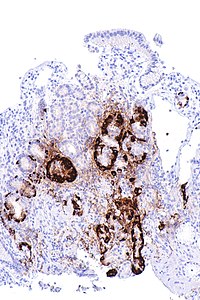
Photo from wikipedia
ObjectiveThis study aims to describe adverse maternal and neonatal outcomes in women diagnosed with anemia in pregnancy.Study designThis was a retrospective cohort study of California live births from 2007–2012, linked… Click to show full abstract
ObjectiveThis study aims to describe adverse maternal and neonatal outcomes in women diagnosed with anemia in pregnancy.Study designThis was a retrospective cohort study of California live births from 2007–2012, linked to maternal and infant hospital discharge records. Relative risks of adverse maternal and neonatal outcomes were calculated for women with and without anemia.ResultsAnemic mothers were more likely to be diagnosed with hypertension, diabetes, placental abruption, or chorioamnionitis, or require a blood transfusion or admission to the intensive care unit (aRRs 1.2–6.8). Infants born to anemic mothers were more likely to be born preterm (8.9% versus 6.5%), but not more likely to suffer morbidities associated with prematurity.ConclusionIn a population-based study, the diagnosis of anemia in pregnancy carries a higher risk of peri-partum, intra-partum, and post-partum complications for the mother, and a higher risk of preterm birth for the infant.
Journal Title: Journal of Perinatology
Year Published: 2019
Link to full text (if available)
Share on Social Media: Sign Up to like & get
recommendations!